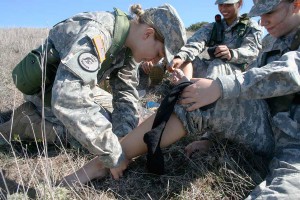ROTC women to have option of combat roles
U.S. Secretary of Defense Leon Panetta announced on Thursday the lift of the long-standing ban on women serving in combat, a policy change that might expand future opportunities for women in USC’s Reserve Officers’ Training Corp program.

ROTC · Female members of USC’s Reserve Officers’ Training Corps, such as those pictured above at a training camp in October 2011, will be allowed to serve in combat now that the Pentagon has lifted its ban. – Daily Trojan file photo
Female cadets currently in USC’s ROTC program could possibly enter combat when the ban is fully lifted by the Pentagon’s January 2016 deadline.
Though hundreds of thousands of women have been deployed and women frequently find themselves in combat — more than 800 women have been wounded and 130 have died in Iraq and Afghanistan as of last year — overturning the 1994 Pentagon ban on women in combat roles will allow women to formally advance through the ranks.
“Women who are going through our ROTC program will be able to go into branches of the military that were historically closed to women, particularly infantry and armor,” said Robert Kirkland, commanding officer of USC Army ROTC and a professor of military science. “Women will also be able to go into those branches as officers.”
Though this development will have a significant effect on the equality of the U.S. armed forces as a whole, it will not have a major effect on the ROTC training program itself, according to U.S. Navy Lt. Cmdr. Nate Christensen.
“The goal is to take away any barriers to service and grant women the same opportunities as men,” Christensen said. “So, it doesn’t really affect the ROTC program, it affects [the cadets’] futures.”
Kirkland said the training programs for men and women are already extremely similar — the only difference is men have higher physical-training expectations. The breadth and quality of on-campus learning and skill training in the field, however, is the same for all cadets.
“In ROTC, there is no difference between the training for men and women,” Kirkland said. “The things that we do to prepare them for service will not change due to this new policy.”
The policy is so new that it is difficult to foresee the impact it might have on ROTC recruitment. Kirkland, however, is confident that lifting the ban will promote enrollment in the program because of the newly opened opportunities for women.
Nationwide response to the news has been mixed. Many view Panetta’s decision as a landmark victory for military equality. Proponents hope that the some 250,000 jobs now opened to women will help pave the way for female advancement in leadership and access to benefits. Others are skeptical about certain practical implications. There are concerns about soldiers’ privacy and a possible increase in the number of female casualties.
“Lifting the ban on women in combat is definitely a step towards gender equality,” said Varun Dhaon, a freshman majoring in economics. “This change just needs to be implemented in a way that ensures safety for the women on the frontline from being targeted by outside and internal forces, in regard to both armed conflict and sexual harassment.”
Reactions to the news from ROTC students and officers of the ROTC program have been largely positive. Cadet Julianna La Luzerne, a sophomore majoring in cognitive science, sees the change as a big step for women in the military.
“They’ve seen in the past years that women are capable of doing the things men can do,” La Luzerne said. “All women need is the opportunity to display their talents … [We shouldn’t] cut them off before they have the ability to show what they can do.”
Kirkland thinks the new policy will be accepted and celebrated by women in the ROTC program.
“The military has always been an agent of positive change in a number of areas,” Kirkland said. “Any time you can be more inclusive, it’s a good thing.”
